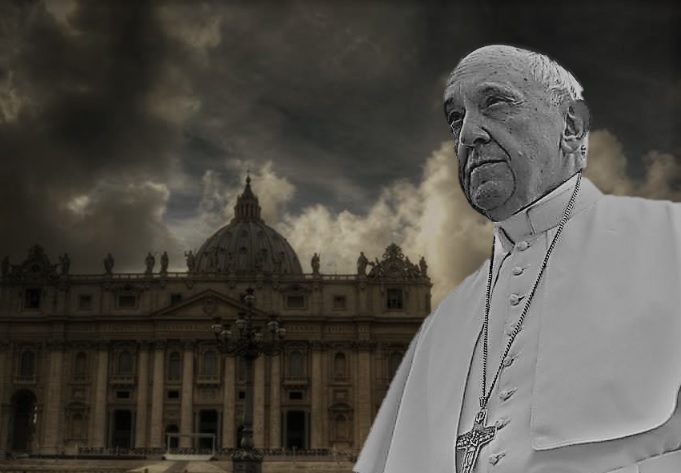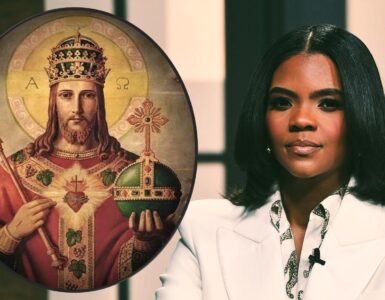This article originally appeared in the February 2018 print edition of Catholic Family News (click HERE to subscribe; current subscribers can access the E-Edition HERE).
“Our help is in the Name of the Lord, Who made heaven and earth.” – Psalm 123:8
Kazakhstan Bishops’ Profession
The Amoris-Dubia Drama, on which I reported in November and December of last year, has taken some interesting twists and turns over the past several weeks, beginning with the “Profession of the Immutable Truths about Sacramental Marriage” of the bishops of Kazakhstan. On the last day of the Fatima Centenary (Sunday, Dec. 31, 2017), the Ordinaries of the former Soviet republic issued a six-page document in which they respectfully but firmly oppose the errors emanating from Amoris Laetitia – errors which are being propagated, not only by “various bishops…at local, regional, and national levels”, but also by “the supreme authority of the Church” (i.e. Pope Francis).
After quoting a plethora of sources (some more sound than others), Archbishops Tomash Peta and Jan Pawel Lenga, together with Auxiliary Bishop Athanasius Schneider, make clear their reason for issuing their Profession:
“As Catholic bishops…we are forced in conscience to profess in the face of the current rampant confusion the unchanging truth and the equally immutable sacramental discipline regarding the indissolubility of marriage according to the bimillennial and unaltered teaching of the Magisterium of the Church.”
They go on to “reiterate” seven fundamental truths concerning marriage and the Church’s sacramental discipline, primarily for the benefit of “the faithful who await from us a public and unequivocal profession of the truth,” after which they conclude:
“We affirm therefore in the spirit of St. John the Baptist, of St. John Fisher, of St. Thomas More, of Blessed Laura Vicuña and of numerous known and unknown confessors and martyrs of the indissolubility of marriage:
It is not licit (non licet) to justify, approve, or legitimize either directly or indirectly divorce and a non-conjugal stable sexual relationship through the sacramental discipline of the admission of so-called “divorced and remarried” to Holy Communion, in this case a discipline alien to the entire Tradition of the Catholic and Apostolic faith.
By making this public profession before our conscience and before God Who will judge us, we are sincerely convinced that we have provided a service of charity in truth to the Church of our day and to the Supreme Pontiff, Successor of Saint Peter and Vicar of Christ on earth.”
Problematic Recourse to Vatican II
While the Kazakhstan bishops, along with the few others who have since joined them, deserve credit for speaking up when the overwhelming majority of their confreres remain silent,[1] their Profession does contain some problematic elements, not the least of which being their heavy reliance on Vatican II and post-conciliar documents. Some have speculated this was done by the bishops in order to neutralize attempts of “papal defenders to dismiss their claims as a solely traditionalist critique.” Although that may have been the case, and no doubt with the best of intentions, it was somewhat an exercise in futility, considering that the purpose of the Council, according to the Pontiff who convened it, was to bring the Church “up to date where required” and show the world that, nowadays, “the Spouse of Christ prefers to make use of the medicine of mercy rather than that of severity.”[2]
Note well that Pope Francis quoted these very words of John XXIII in his Bull of Indiction of the Extraordinary Jubilee of Mercy (Dec. 8, 2015 – Nov. 20, 2016), amidst gushing praise for the Council:
“The Holy Year will open on 8 December 2015, the Solemnity of the Immaculate Conception. …
I have chosen the date of 8 December because of its rich meaning in the recent history of the Church. In fact, I will open the Holy Door on the fiftieth anniversary of the closing of the Second Vatican Ecumenical Council. The Church feels a great need to keep this event alive. With the Council, the Church entered a new phase of her history. The Council Fathers strongly perceived, as a true breath of the Holy Spirit, a need to talk about God to men and women of their time in a more accessible way. The walls which for too long had made the Church a kind of fortress were torn down and the time had come to proclaim the Gospel in a new way. …
We recall the poignant words of Saint John XXIII when, opening the Council, he indicated the path to follow: ‘Now the Bride of Christ wishes to use the medicine of mercy rather than taking up arms of severity… The Catholic Church, as she holds high the torch of Catholic truth at this Ecumenical Council, wants to show herself a loving mother to all; patient, kind, moved by compassion and goodness toward her separated children’. Blessed Paul VI spoke in a similar vein at the closing of the Council: ‘We prefer to point out how charity has been the principal religious feature of this Council… The modern world’s values were not only respected but honored, its efforts approved, its aspirations purified and blessed…’” (Misericordiae Vultus, n. 3, 4)
Less than one year later, Francis released (perhaps unleashed is more appropriate) Amoris Laetitia (AL), in which he connects his dubious document (pun intended) to the Extraordinary Jubilee of Mercy:
“This Exhortation is especially timely in this Jubilee Year of Mercy. First, because it represents an invitation to Christian families to value the gifts of marriage and the family, and to persevere in a love strengthened by the virtues of generosity, commitment, fidelity and patience. Second, because it seeks to encourage everyone to be a sign of mercy and closeness wherever family life remains imperfect or lacks peace and joy.” (AL, n. 5)
And also:
“This approach [of accompaniment] is also confirmed by our celebration of this Jubilee Year devoted to mercy. … Let us not forget that the Church’s task is often like that of a field hospital.” (AL, n. 291)
It seems obvious, therefore, based on the words and deeds of Francis (among numerous other reasons), that the Second Vatican Council is not a suitable fortress from which to launch a counter-offensive in this fight to preserve both Divine and natural law.
Why a Profession Instead of Correction?
As for the Profession, even if it only made reference to pre-conciliar sources, it would still lack the one thing truly needed at this late hour, namely, a formal correction of the Pope – the correction we were told by Cardinal Raymond Burke “would probably take place sometime after” the Feast of the Epiphany…2017. Yet here we are, well over a year later, and nothing substantial has been done to actually stop Francis’ wrecking ball. And based on recent developments, it’s looking more and more like a formal correction is not going to happen. (CFN contributor Christopher Ferrara is now certain it will not happen, at least not as something coming from Cardinal Burke.)
Just a few days after the Profession was released, Bishop Athanasius Schneider gave an interview to Rorate Coeli in which the following exchange took place:
“[Rorate Coeli]: We have heard now, for over a year, that a formal correction coming from the cardinals is imminent, yet nothing has happened. What do you believe is the hold up?
[Bishop Athanasius Schneider]: In the face of the current temporal and partial eclipse of the function of the Papal Magisterium concerning concretely the defense and practical enforcement of the indissolubility of marriage, the members of the episcopal and of the cardinalitial colleges have to assist the Pope in this Magisterial duty through public professions of the immutable truths which the Ordinary and Universal Magisterium — that means what all the Popes and the entire episcopate during all times – have taught concerning the doctrine and the sacramental practice of the marriage.
RC: If a formal correction is made by a number of cardinals, and Francis continues to officially approve of bishops’ conferences giving Holy Communion to some divorced and remarried, then what?
BAS: There exists the following principle of the traditional Catholic doctrine since the first centuries: “Prima sedes a nemine iudicatur”, i.e., the first episcopal chair in the Church (the chair of the Pope) cannot be judged by anybody. When bishops remind the Pope respectfully of the immutable truth and discipline of the Church, they don’t judge hereby the first chair of the Church; instead, they behave themselves as colleagues and brothers of the Pope. The attitude of the bishops towards the Pope has to be collegial, fraternal, not servile and always supernaturally respectful, as it [sic] stressed the Second Vatican Council (especially in the documents Lumen Gentium and Christus Dominus). One has to continue to profess the immutable faith and pray still more for the Pope and, then, only God can intervene and He will do this unquestionably.”
Based on his eloquent but elusive answers, he seems to be diplomatically avoiding any direct discussion of a formal correction. He did not offer his opinion about possible reasons for the hold up, nor address the issue of what will happen in the event that a formal correction is issued and ignored (this seems to be a highly probable scenario, considering Francis’ track record). Why did he avoid those crucial questions?
Who Will Stand Up to Francis?
Dear readers, please understand: I have great respect for Bishop Schneider and the good he is trying to do for Holy Mother Church. I had the privilege of hearing him speak in person at the 2017 Catholic Identity Conference and was impressed with his remarks. I certainly would not want to be in His Excellency’s shoes, forced to face the “Dictator Pope” and his “Kremlin Santa Marta” (to quote the mysterious Marcantonio Colonna) with next to no support from the vast majority of the hierarchy.[3]
Nevertheless, and with all due respect, there is more to be done than “profess[ing] the immutable faith and pray[ing] still more for the Pope…” As Steve Skojec commented last November, in reference to the one-year publication anniversary of the Dubia and Cardinal Burke’s rather timid interview marking the occasion:
“Saying ‘Please stop’ hasn’t worked as a strategy before now, and the urgency — is there a sense of urgency behind the calm restatement of the problem? — demands more. The time for deference and patience, I fear, has passed [indeed, it has!]. The faithful are seeing the man on the Throne of St. Peter flouting divinely-revealed teaching and the safeguards of his divinely-assisted office — and getting away with it.”
This, dear readers, is the crux of the matter: Pope Francis is getting away with making a mockery of Our Lord, His Church, and His Law. And not only that (which is quite enough), he is even violating the terms of his own exhortation, which states in the infamous eighth chapter:
“Naturally, if someone flaunts an objective sin as if it were part of the Christian ideal, or wants to impose something other than what the Church teaches, he or she can in no way presume to teach or preach to others; this is a case of something which separates from the community (cf. Mt 18:17). Such a person needs to listen once more to the Gospel message and its call to conversion.” (AL, n. 297)
This is precisely what Francis is doing: attempting “to impose something other than what the Church teaches” concerning marriage and the reception of the sacraments! Is there not a single cardinal or bishop among the entire hierarchy with the courage necessary to call Francis to account, to state with clarity and true charity that he is in grave danger of separating himself from the Church? After all, Cardinal Walter Brandmüller has rightly said, “Whoever thinks that persistent adultery and the reception of Holy Communion are compatible is a heretic and promotes schism.”
Our Duty as the Faithful
What, then, shall we do? We, the simple lay faithful, who have families and children and jobs and all manner of distractions and temptations in this increasingly hectic world? The answer is simple, although not easy: We must be who we are – the faithful – regardless of what the men in the hierarchy choose to do or not do. We must be faithful to the vows of our baptism and confirmation, even if “the body of the episcopate [is] unfaithful to its commission,” as Blessed John Henry Cardinal Newman (1801-1890) famously wrote.[4]
Practically speaking, this means we must know and live our Faith well enough to hand it on effectively to our children and grandchildren. We must not be afraid to boldly speak “the truth in charity” (Eph. 4:15) and reject “profane novelties” (1 Tim. 6:20) from wherever and whomever they come – whether priest, bishop, or even the Pope. We must be serious about our own spiritual lives and pursue real growth in virtue, even – or perhaps especially – amidst the chaos of our daily grind. And finally, we must strive to be “the ecclesiastical strength,” as Cardinal Newman wrote, of our “great solitary confessors,” whoever they may be.
Postscript: Something else you can do, dear readers, is plan to attend the upcoming Weapons of Our Warfare conference hosted by Catholic Family News. Register here and we’ll see you there!
[1] Of the roughly 5,400 living Catholic bishops worldwide (see http://www.catholic-hierarchy.org/bishop/ll.html), only a handful (eight total, as of this writing) have chosen to sign a Profession affirming basic truths of the Faith which every bishop is bound by God to defend unto death.
[2] Pope John XXIII, Gaudet Mater Ecclesia (Opening Address at the Second Vatican Council, 11 Oct. 1962). Quotes taken from English translation found in Walter M. Abbott, S.J. (Gen. Ed.), The Documents of Vatican II (New York: The America Press, 1966), pp. 710-719.
[3] It does seem providential, however, that he – Athanasius Schneider, who grew up in the “clandestine Church” (as he calls it) under Soviet oppression – has been raised up during this time of unprecedented crisis. Learn more by reading his Jan. 11, 2018 exclusive interview with the National Catholic Register conducted by Edward Pentin.
[4] Blessed John Henry Cardinal Newman, “On Consulting the Faithful in Matters of Doctrine,” Sect. 3, n. 5




